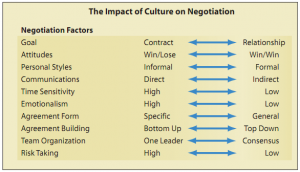http://iveybusinessjournal.com/publication/negotiating-the-top-ten-ways-that-culture-can-affect-your-negotiation/#.U6nh-bHyRqw
This diagram is from the article and aptly summarizes a valuable set of dimensions through which to think about negotiation.
I won’t dive into the details, the article does it better and I’d recommend you read the article. I’ll just sell the article by talking briefly about the value of these skills.
The value of negotiation is that it helps you get what you want in life, and it is involved in every stage of getting what you want. Let’s say you’re hungry and you see a restaurant selling a hot plate of spaghetti for $11.99. That is a negotiation. The restaurant has proposed an exchange of $11.99 for food, and you can accept, or reject. This is an example of an ultimatum strategy of negotiation. The explicit terms of the negotiation is obvious, the implicit terms of the negotiation are not obvious. Every restaurant has a sign displayed that says “we reserve the right to refuse service to anyone.” This means that your option to execute the purchase order for spaghetti is not guaranteed. You still have to negotiate for the product by behavior in a socially acceptable manner, not being insulting, not being rude, disrespectful, etc. to the staff who will be serving you. Purchase is the basic form of negotiation.
Relationship is the complex form of negotiation, and this is further subdivided into personal and business relationships. If you want to go to the park with a friend, that is a negotiation: the cost to each person to travel to the park, and the amount of happiness derived from the trip has to be of high enough interest to all parties for the activity to occur. Thus, negotiation is employed for you to get what you want, which is to go to the park with a friend. In a business, a manager wants an employee to do work, so they negotiate over the terms of the work and the terms of the pay. The manager is trying to get what he/she wants: work from the employee, and the employee is trying to get what he/she wants: pay.
Negotiation is different from persuasion. Persuasion is about generating interest in the transaction, about creating the opportunity. If the restaurant didn’t serve spaghetti, but had all the ingredients for it and the chef knew how to make it, persuasion would be talking to the owner and asking them to make spaghetti for you. Negotiation takes over after the option exists, after the opportunity has been created, and is used to determine the terms of the transaction: price of the spaghetti.
To find out when those posts, and other life education writing, are released, subscribe on the side! Follow on Twitter, on Facebook, on Google+, on Tumblr.
